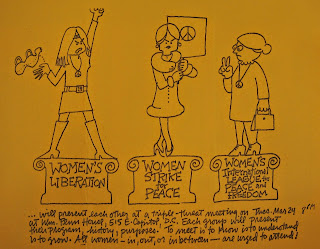In Judy Tzu-Chun Wu's,
"Radicals on the Road: Internationalism,
Orientalism, and Feminism During the Vietnam Era," a key portion that struck me was the
discussion of the Indochinese Women's Conference, often referred to as the
IWCs. In 1971, the IWC served as a first opportunity for North American womxn
to have "direct contact" with their "Asian 'sisters'". It
quite literally was an experience that is perfectly incapsulated by the
chapter's title, "We met the 'Enemy' - and They Are Our Sisters"
because for many American womxn who attended, they had experiences which
shifted their mindset to one summarized as such. A primary reason that this
portion of the book really struck me was because womxn really pulled through
for their fellow "sisters" and crossed international borders to fight
and stand in solidarity to build an international antiwar movement whilst
simultaneously building "global sisterhood".
To me, this is
exceptionally empowering because it has a lot of relevance today. To this day,
womxn are still fighting for their rights and are striving to come together in
solidarity and unity to stand up against those who try to continue oppressing
us. Additionally, the antiwar movement is extremely relevant as the U.S. is
currently on the brink of war - as the war with Iran is currently a pressing
issue, many antiwar movements are rising to express their disagreement with the
consideration of war. As a result, it is really empowering to see that womxn
from the past generation joined together to stand against issues that are
presently still very relevant. However, it is also unfortunate to see that
these are still such pressing issues to this day, even after several decades
have passed since the first IWC.
Throughout reading
Wu's piece, I found myself thinking about Professor Valverde's concept of
"normalized suffering". Much of discussion in the IWC was centralized
on the narrative of Vietnamese womxn who had to undergo immense suffering and
make numerous sacrifices. Their narratives are extremely relevant and I believe
it's important that they be discussed, however, I couldn't help but feel that
their sufferings were being "normalized' like Professor explains.
Additionally, when discussing the stories of different womxn from differing
cultural backgrounds, it appears that their sufferings are normalized too. As a
result, it makes me raise the question of how can we honor the hxstories and
narratives of these womxn and their empowering international fight for antiwar
movements without "belittling" their stories as a result of
"normalizing their suffering" that they endured before, during, and
after the movements?
Depicted is an image
of "Triple Threat" that represents three pillars of womxn's
organizations standing in solidarity.

Source:
No comments:
Post a Comment